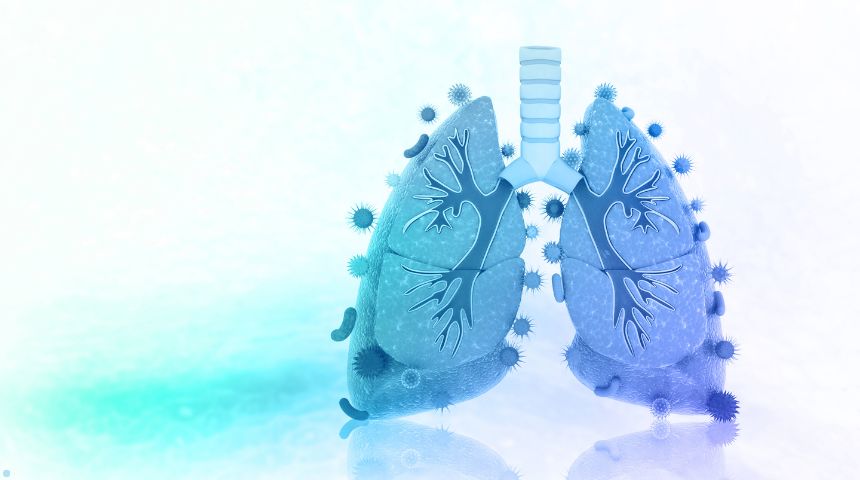5 Options to Treat Pneumonia
Pneumonia is an infection spread by coughing or water droplets. This infection causes inflammation in the air sacs of the lungs, which is where the body exchanges oxygen and carbon dioxide. It can quickly become a life-threatening situation, especially for older adults. Thankfully, there are pneumonia treatments in adults that can help relieve symptoms.
In this article we look at the types of pneumonia treatment in adults. Let's get started.
1. Antibiotics
Commonly acquired pneumonia, or bacterial pneumonia, is frequently treated with antibiotics. However, it’s worth noting that some antibiotics may be ineffective. It may take some trial and error to properly identify the bacteria causing pneumonia. For instance, your doctor may prescribe one antibiotic, but if your symptoms don’t improve, they'll then prescribe a different antibiotic.
Another thing worth noting with antibiotics is the importance of completing your prescription. While you may begin to feel better within a matter of days, if you don’t complete the round of antibiotics, the infection may return, and be more difficult to treat.
Antifungal medications may also be prescribed if the infection is caused by fungus.
2. Antiviral Medication
Antiviral medication may be prescribed if pneumonia is determined to be viral and an individual is having difficulty recovering. These medications can then reduce the amount of time you’re sick. Some examples of antiviral medications that may be prescribed include:
- Oseltamivir (Tamiflu®).
- Zanamivir (Relenza®).
- Peramivir (Rapivab®) .
3. Over-the-Counter Medications
Your doctor may also recommend certain over-the-counter drugs to help combat a fever or muscle pain. However, it’s always wise to discuss taking these medications with your doctor before incorporating them into your treatment plan. Some drugs may have certain interactions with prescribed medications, which could potentially lead to complications or other issues.
Your doctor is also likely to advise that you consume plenty of fluids to help support your body and its fight against the virus or infection. In fact, keeping a humidifier in your living space may also help with any breathing issues, helping you get adequate sleep and rest.
4. Oxygen Therapy
This is often used if you require a hospital stay to treat pneumonia. If this is the case, you may also be provided with certain medications and fluid via an IV. Essentially, oxygen therapy involves the delivery of oxygen through a mouth mask or nose tube. This helps increase the amount of oxygen in your blood. For more serious cases, a ventilator may be used for the same outcome.
5. Surgery and Other Procedures
In more extreme cases, fluid may build up between the lungs and chest wall. As such, this fluid may need to be drained, which would require surgery or the use of a catheter.
Surgery for treating pneumonia may also involve the removal of damaged lung tissue or severely infected tissue. Surprisingly, this can help speed up recovery and prevent the return of pneumonia post-recovery.
Preventing Pneumonia
Recovery from pneumonia typically takes about one to two weeks. Yet, for more severe cases, it can take a month or longer. The effects can also be prolonged, with many complaining of fatigue even after recovery.
While many treatment options are available for pneumonia, it can also be beneficial to know proactive ways to prevent it. This is especially true for infants, older adults, or those with compromised immune systems.
For instance, the pneumonia vaccine, also called the pneumococcus vaccine, can prevent this condition. It may be ideal for:
- Adults over the age of 65.
- Children under 2 years of age.
- Individuals with compromised immune systems.
- Individuals who smoke.
The flu vaccine can also prevent pneumonia caused by the flu virus. Typically, this vaccine is given before the onset of flu season in September or October each year.
Lastly, the Hib vaccine is usually recommended for children under five years of age to prevent pneumonia caused by the Hib bacteria.
Other ways to prevent pneumonia (and other illnesses) include:
- Washing your hands regularly and before eating.
- Quitting smoking (if you’re a regular smoker).
- Getting regular physical activity.
- Eating a healthy and balanced diet.
- Finishing rounds of antibiotics when prescribed.
- Resting and taking time to recover when sick.
It’s also worth noting that pneumonia can go away on its own. Yet, it’s important to follow any advice given to you by your doctor so it doesn’t worsen.
Final Notes
At the end of the day, pneumonia can be a serious and life-threatening condition, especially for vulnerable populations. Yet, with the right precautions, you may be able to avoid it altogether. If you do contract pneumonia, however, it’s important to seek out advice from your healthcare provider. They know you and your health situation the best, and can determine the right pneumonia treatment in adults.
The information on this website is for general educational purposes only and is not a substitute for professional medical advice. Always consult your doctor or qualified healthcare provider before making changes to your health, diet or treatment plan.

